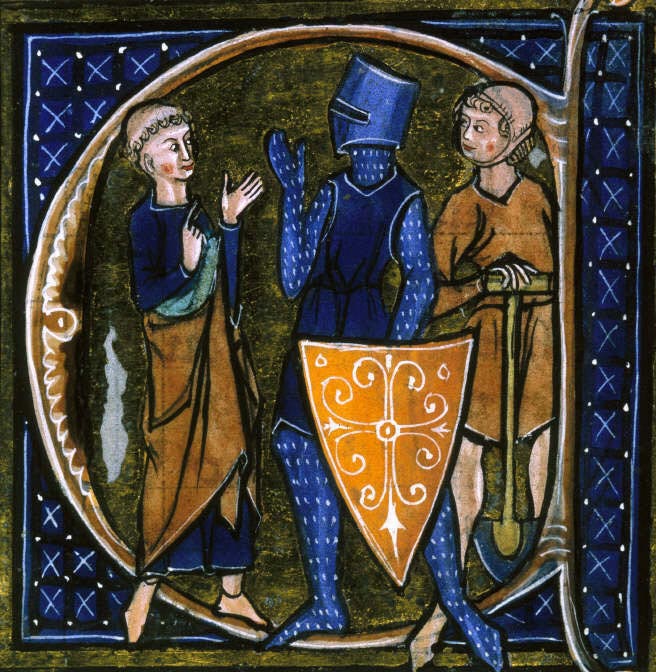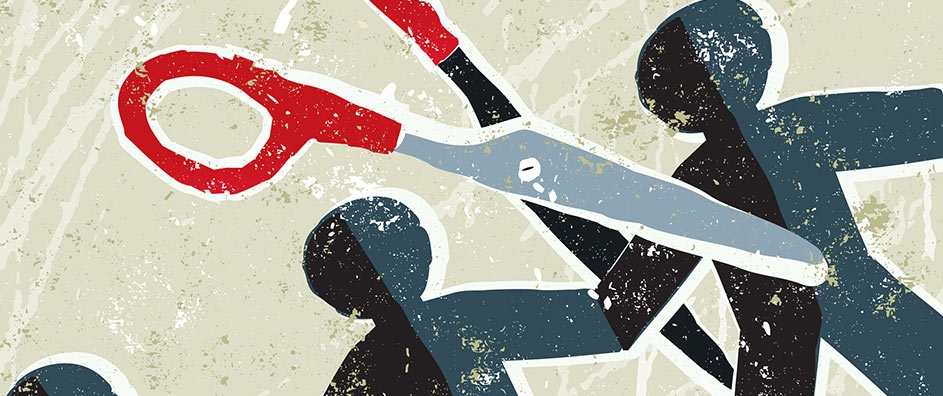The views expressed in our content reflect individual perspectives and do not represent the authoritative views of the Baha'i Faith.
…the inordinate distinction between classes will be obliterated. Destitution on the one hand, and gross accumulation of ownership on the other, will disappear. – Shoghi Effendi, The World Order of Baha’u’llah, p. 203.
In the old cultures—and even in some that still exist—society separated everyone into a fixed, immutable, inherited hierarchy of distinctly different classes.
Called “the estates of the realm” in the Middle Ages, the best-known “three-estate” system came from France: the clergy as the first estate; the nobility and warriors as the second estate; and the commoners as the third estate.

A 13th century French representation of the tripartite social order
French law defined them this way—1.) the Oratores, the orators, or “those who pray,” 2.) the Bellatores, the nobility and its soldiers, or “those who fight,” and 3.) the Laboratores, the laborers, “those who work.” If you were born into French society during the Middle Ages, you were born into one of those estates or orders, and you died in that same class. Social mobility rarely occurred.
This fixed class system, violently overthrown by the French revolution in 1789, represented the old ways of feudalism and the monarchy all across the world. Because the first and second estates ruled and invariably repressed the vast majority of commoners, who made up more than 90% of the population, the commoners rose up and overthrew them, profoundly affecting the course of the planet’s history and leading the way for a mass transition to democratic republics over the course of the next two centuries.
We can see the remnants of these birth-based three-estate class systems in many places. From England’s House of Commons and House of Lords to the hierarchical caste systems in places like India, Nepal, Pakistan, Yemen and Sri Lanka, humanity still holds on, whether symbolically or in reality, to the ancient, outmoded ways of separating people into classes. In the Western world, we do it with money or skin color or celebrity rather than by inherited position—so class distinctions still separate us, much as they did in the old estate system.
The Baha’i Faith calls for an end to that archaic practice, and the rise of human equality everywhere:
Praise be to God, that the gloomy nights of ignorance have flitted away across the receding ages, and the bright dawn of intelligence and wisdom is becoming visible. Praise be to God, that the cold winter of fanaticism and bigotry, with its chilling hand and irrational heterodoxy has come to an end, and the soul-refreshing springtime of the imperishable flowers and hyacinths of universal love and toleration, has dawned, perfuming all the nostrils with the sweet odours of trust and confidence. Praise be to God, that the black clouds of human limitations and man-made restrictions are dispelled, and the world-enlightening Sun of the Kingdom hath dawned from the horizon of the hearts! Praise be to God that the chains of injustice and the fetters of the oppression of the Pharaohs of the earth and the despotic rulers of men have crumbled to dust, and the age of justice, equity, brotherhood and real democracy is inaugurated. Praise be to God that the crowns of the despots have fallen to the earth, and the thrones of the absolutists are shaken to the foundation. But the real diadems of glory and power and the royal seats of just governments and democratic institutions were raised high. – Abdu’l-Baha, Star of the West, Volume 6, pp. 111-112.
So how do we rid ourselves of the old class distinctions—and the new ones? When Karl Marx wanted to establish a “classless society,” he and the governments based on his principles sanctioned the use of violence to accomplish their ends. The Baha’i teachings recommend a completely different method:
In the Bolshevistic principles equality is effected through force. The masses who are opposed to the people of rank and to the wealthy class desire to partake of their advantages.
But in the divine teachings equality is brought about through a ready willingness to share. It is commanded as regards wealth that the rich among the people, and the aristocrats should, by their own free will and for the sake of their own happiness, concern themselves with and care for the poor. This equality is the result of the lofty characteristics and noble attributes of mankind. – Abdu’l-Baha, Foundations of World Unity, p. 43.
This kind of spiritual class-breaking, which encourages every person to willingly transcend the social class they were born into, especially addresses the wealthy. Abdu’l-Baha asks “the rich among the people, and the aristocrats,” to voluntarily extend themselves to the service of the poor; to freely support the needs of society; to spend what they don’t need on the betterment and enhancement of society. That long-term spiritual solution to the problem of class asks each one of us, no matter which societal class we occupy, to transcend and transform the class distinctions that keep us apart.
















Comments
Sign in or create an account
Continue with Googleor